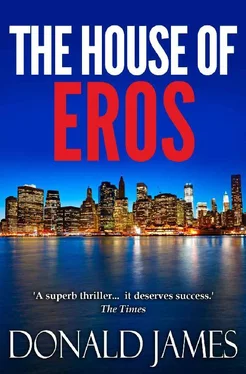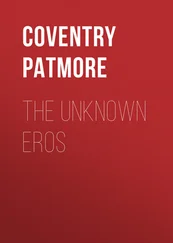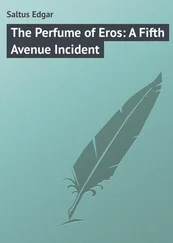She nodded, turning the door handle.
‘Still got a very pretty ass there, Louise,’ he whispered as she stood, her hand shaking on the door handle. Her mouth tightened. Cy grinned. ‘Just kidding.’ His voice rose from the whisper. ‘Goodbye, Mrs Cartwright. Nice meeting you. I’ll have my secretary look into the details and let you know.’
Fear is a distorting mirror.
It was the first time Nan Luc had been in New York and the city, at this end of Manhattan Island, was neon signs and rubbish in battered shop doorways; grafitti and Hispanic voices; sauntering black youths in parti-coloured anoraks and white trainers; lights and music on wide, run-down boulevards and empty demolition lots in the dark streets behind.
And fear. Fear that she might be unable to fight back, as she had been unable to fight back against Quatch. Fear brought to the surface that she was, in the last resort, too timorous, that she lacked the savagery to avenge her family.
The taxi had dropped her too soon. She knew that, at least, by the street numbers. She had asked directions from a man who had stumbled past without answering and a pale-faced girl who seemed to think she was here buying crack.
She turned at the next intersection. Cars cruised along it but there were, quite suddenly, no people. She moved on quickly, checking until she saw with despair the number she wanted was a burnt out bakery. She stopped. A cold blast of wind rattled dark windows above her head. Snow, like salt, was driven through the pools of light below the streetlights.
She walked on quickly. Her heels clicked echoingly between the tattered shop fronts. She knew how totally female a sound was that. She took a left and then a right down a short narrow street between high buildings decorated with fire escapes. Under a street lamp a human bundle lay on a doorstep, defended by a rampart of old cloth bags. Steam rose through the street lights.
Nan Luc stopped. The old woman was awake, smiling. ‘Excuse me, do you know a restaurant near here called Saigon-Hue?’
‘A restaurant?’ The old woman puckered her grimy brows.
‘A Vietnamese restaurant.’
‘There’s a diner a block away. You can get sum’un to eat there.’
‘No, I’m looking for one special restaurant,’ Nan Luc said carefully. ‘The Saigon-Hue on Dixon Street.’
‘Dixon Street?’
‘You know it?’ The old lady shook her head. ‘Do you know where I can get a taxi?’ Nan Luc said urgently.
‘A taxi,’ the old woman cackled. She raised herself on her elbow. ‘There’s a subway down there.’
Nan Luc shook her head. ‘I’m lost. I need a taxi. I need to get back to Lennox Avenue to find a taxi.’
The old lady thought hard. ‘I’m from New Jersey myself,’ she said finally. ‘South Amboy. You know it?’
Two men were approaching on the other side of the street. Their faces under the street light were dark, not black. One of them wore a wide brimmed hat, tipped back. It was their sauntering walk that made her afraid.
She knelt down quickly beside the old lady. ‘My folks was travellers,’ the old lady said. ‘But at the last, they said, you’ve got to settle. When we came to Jersey I stayed around a while then moved on.’
The men’s footsteps were close now, almost level with the doorway. She crouched lower. More than anything she was fearful that they would see her legs.
‘Hey, lady,’ one of the men called, stopping on the sidewalk opposite.
She stood up. The subway. She began walking rapidly in the direction the old lady had pointed. Only after a hundred yards or so, did she look round. The two men were behind her, approaching, their sauntering walk speeded. ‘Hey lady,’ she heard again.
The subway station was cast iron, boarded, unused. She circled it once looking for an entrance. The man in the wide hat played peek-a-boo round the side of it. ‘Hey lady,’ he said and pulled back out of sight, laughing. ‘The bag lady say you’re looking for the Saigon-Hue?’ He pointed. ‘Just across the street there, lady.’
On the street corner a flicker of neon stuttered Saigon-Hue. From a clutch of Chinese lanterns light shone from the one remaining bulb down on to the dark green and red painted entrance door.
Nan moved warily to pass him. The man in the wide brimmed hat stepped aside. ‘I like it Chinese, too,’ he whispered in her ear as she passed him.
Reaching the restaurant she pressed her face close to the glass pane. Through a bamboo screen on the window Nan Luc could see candle-lit tables, mostly unoccupied. She pushed open the door and a young Vietnamese in jeans and an expensive black silk shirt emerged from the shadows.
‘This is a private dub,’ he said in English. ‘You know someone here?’
‘Kim Hoang sent me. To see Kiet Vo Tron.’ The young man’s manner changed, relaxed. ‘I’m an old friend of Kim’s,’ Nan said. ‘Now he’s away on assignment, I’m borrowing his apartment.’
‘OK,’ the boy said. ‘You’re Nan Luc, right? We know all about you. He called this morning. He’s covering the election in Atlantic City. Will the Vietnamese vote for a black mayor? I could tell him now, no way.’ The boy reminded her of some of the Ricains in Independence Square, desperately aping a streetwise American style.
‘Is Mr Tron here?’ Nan asked.
‘Sure.’ He was leading the way towards a red painted, bolted iron staircase. ‘The way Kim Hoang told it,’ he clattered down the stairs, ‘I thought you’d be older. He said you led him and twenty or thirty others out of Vietnam.’ He had paused looking up at her from the angle of the red iron stair. ‘Right?’
‘I set it up.’ Nan followed him down. ‘But we all did it together.’
‘OK,’ he grinned over his shoulder as he jumped down the last steps. ‘Then you won’t be upset by this.’ He was pointing to a thick purple curtain which obscured the rest of the basement.
She frowned, aware, beyond the curtain, of a breathing silence broken by a sound like many pairs of chopsticks. The boy pulled the curtain. The basement was vast, dimly lit at the edges. Fifty, a hundred Vietnamese men crouched round one pool of light. An abacus clicked as dark figures came silently forward and placed bills in one of the two boxes.
The young man led Nan forward and stopped. She stood, looking over the shadowed heads to the area of light. Two red-combed cocks, the spurs of their yellow feet elongated by sharpened steel picks, circled each other with slow, deliberate paces. Nan watched in fascination as one of the cocks took the centre of the ring, threw back its head and crowed its challenge. The other cock, shuffling long black, green-sheened feathers, stood, its eyes on the challenger. Then in a cloud of dust and feather they were locked together, pecking and clawing, scattering blood over the front rows of no longer silent men.
‘It is an honour for Kiet Vo Tron to be of service to you.’ An old man in jeans and T-shirt and a sort of light bathrobe had moved silently to stand beside Nan Luc. ‘You have seen this sport before, of course.’
Nan shook her head. ‘At home it is no longer allowed,’ she said. ‘I’m sure you still find it in the villages but officially gambling is prohibited.’
The old man smiled, his tongue visible through broken teeth. ‘Come this way, Nan Luc. We have much to talk about.’
Seated in a small boarded room opposite the old man, Nan accepted tea and waited.
‘You’re young to be dealing in such things, Nan Luc.’
‘We are no longer at home,’ she said. ‘In America we must make our way as we must.’
‘You’re a journalist like my kinsman, Kim Hoang.’
‘No.’
‘You are not thinking of entering this evil trade yourself.’
Читать дальше












